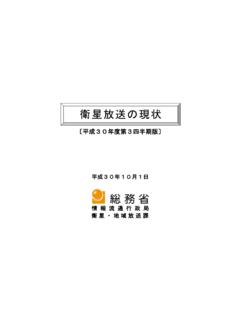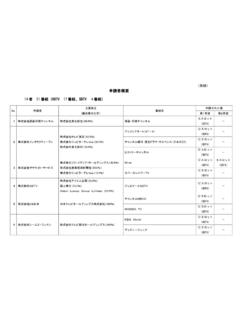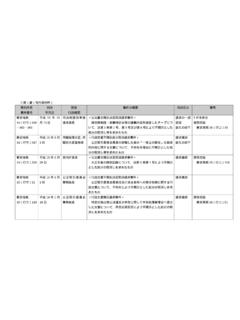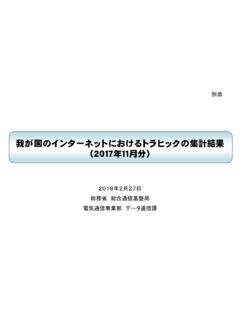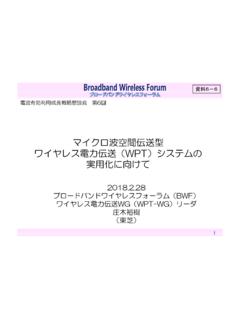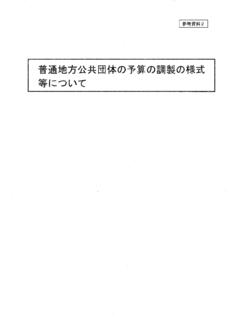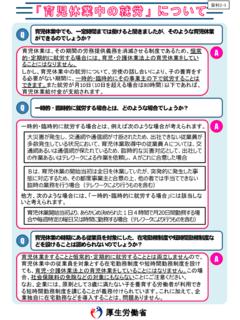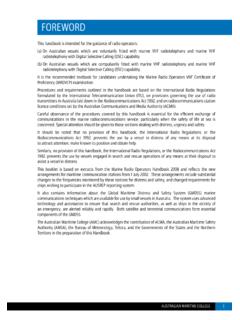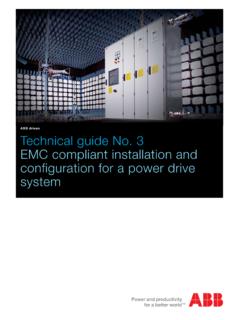Transcription of Radio Law
1 Radio Law (Law No. 131 of May 2, 1950). As amended last by Law No. 21 of 2005 (Law for Amending the Income Tax Law, Etc.). (Unofficial Translation). Ministry of Internal Affairs and Communications (MIC), JAPAN. The Radio Law Radio Law (Law No. 131 of May 2, 1950). As amended last by Law No. 21 of 2005 (Law for Amending the Income Tax Law, Etc.). (Unofficial Translation: In case of inconsistency, the original text in Japanese shall prevail.). Note: For the purposes of this Law, the following rules of construction shall be applied: Except as otherwise clearly indicated by the context: 1. Any word used in the present tense includes the future tense, unless otherwise expressly indicated;. 2. Any word used in the singular number includes the plural number, and the plural number includes the singular number, unless otherwise expressly indicated; and 3. Any word used in the male gender includes the female gender, unless otherwise expressly indicated.
2 4. With respect to effective dates of the provisions , please refer to the relevant provisions of the Supplementary provisions . 5. Unless otherwise expressly indicated, the term "the Minister" means "the Minister for Internal Affairs and Communications" in this booklet. 6. Unless otherwise expressly indicated, the term "the MIC" means "the Ministry of Internal Affairs and Communications" in this booklet. -1- The Radio Law Contents Chapter I. -- General provisions -- ---------------------------------------- ---------------------------- 3. Chapter II. -- Licenses, etc. for Radio Stations -- ---------------------------------------- ----------- 4. Section 1. Licenses for Radio Stations ---------------------------------------- -------------------- 4. Section 2. Registration for Radio Stations ---------------------------------------- ------------- 24. Chapter III. -- Radio Equipment -- ---------------------------------------- ---------------------------- 29.
3 Chapter III-2. -- Technical Regulations Conformity Certification, etc. of Specified Radio Equipment -- ---------------------------------------- ---------------------------------------- 32. Section 1. Technical Regulations Conformity Certification of Specified Radio Equip- ment and Construction Type Certification ------------------------------------- 32. Section 2. Self-Confirmation of Technical Regulations Conformity of Special Speci- fied Radio Equipment ---------------------------------------- ----------------------- 44. Chapter IV. -- Radio Operators -- ---------------------------------------- ------------------------------ 48. Chapter V. -- Operations -- ---------------------------------------- ------------------------------------- 58. Section 1. General ---------------------------------------- ---------------------------------------- --- 58. Section 2. Operation of Coast Stations, etc.
4 ---------------------------------------- ----------- 60. Section 3. Operation of Aeronautical Stations, etc. ---------------------------------------- -- 62. Chapter VI. -- Supervision -- ---------------------------------------- ------------------------------------ 64. Chapter VII. -- Protests and Lawsuits -- ---------------------------------------- ----------------------- 77. Chapter VII-2. -- The Radio Regulatory Council -- ---------------------------------------- ----------- 81. Chapter VIII. -- Miscellaneous provisions -- ---------------------------------------- ----------------- 87. Chapter IX. -- Penal provisions -- ---------------------------------------- ---------------------------- 109. Tables ---------------------------------------- ---------------------------------------- ----------------- 116. Supplementary provisions ---------------------------------------- ---------------------------------------- - 119.
5 -2- The Radio Law Chapter I. -- General provisions -- (Purpose). Article 1. The purpose of this Law is to promote public welfare by ensuring the equitable and efficient utilization of Radio waves. (Definitions). Article 2. With respect to interpreting this Law and orders issued thereunder, the following definitions shall be taken: i) " Radio waves" means electromagnetic waves of frequencies up to 3,000,000 MHz. ii) "Radiotelegraphy" means communications equipment devoted to transmitting or receiv- ing codes by Radio waves. iii) "Radiotelephony" means communications equipment devoted to transmitting or receiv- ing voices and other sounds by Radio waves. iv) " Radio equipment" means radiotelegraphy, radiotelephony or any other electric equip- ment used for transmission and/or reception of Radio waves. v) " Radio station" means a unit of Radio equipment with the person(s) to operate Radio equipment.
6 However, this shall not include those used solely for receiving purposes #. vi) " Radio operator" means a person who operates Radio equipment or supervises such operation, and holds a license granted by the Minister. # The Regulations for Enforcement of the Radio Law, Article 5. (Conventions Related to Radio Waves). Article 3. If any Convention provides otherwise for Radio waves, the provisions shall prevail. -3- The Radio Law Chapter II. -- Licenses, etc. for Radio Stations -- Section 1. Licenses for Radio Stations (Establishment of Radio Stations). Article 4. Any person who wishes to establish a Radio station shall obtain a license from the Minister. This shall not apply to: i) Radio stations operating with extremely low power of emission as specified in the applicable MIC ordinance #. ii) Radio stations that operate in the frequency band of to MHz with antenna power of watts or less and are specified in the applicable MIC ordinance #, and which exclusively use Radio equipment attached with a mark as stipulated in Article 38-7.
7 Paragraph (1) (including the cases where Article 38-7 paragraph (1) shall apply, mutatis mutandis, in Article 38-31 paragraph (4)), Article 38-26 (including the cases where Article 38-26 shall apply, mutatis mutandis, in Article 38-31 paragraph (6)) or Article 38-35 (except one deemed having no mark as stipulated in Article 38-23 paragraph (1). (including the cases where Article 38-23 paragraph (1) shall apply, mutatis mutandis, in Article 38-29, Article 38-31 paragraphs (4) and (6), and Article 38-38); hereinafter referred to as Radio equipment with conformity mark ). iii) Radio stations with antenna power of watts or less as specified in the applicable MIC. ordinance, which automatically transmit the call signs or call names designated under the provisions of the following article, or which may operate without causing interference with or disturbance to the operation of other Radio stations by being equipped with receiving functions and other functions specified by the applicable MIC ordinance, and which exclusively use Radio Equipment with Conformity Mark.
8 Iv) Radio stations established by obtaining a registration of Article 27-18 paragraph (1). (hereinafter referred to as a "registered station"). # The Regulations for Enforcement of the Radio Law, Article 6. (Designation, etc. of Call Signs or Call Names). Article 4-2. When an application is submitted by a person who seeks the designation of a call sign or a call name of a Radio station with regard to the Radio equipment used for the Radio station referred to in item iii) or item iv) of the preceding article, the Minister shall designate such a call sign or a call name in accordance with the applicable MIC ordinance #. # The Regulations for Enforcement of the Radio Law, Article 6. (Disqualification). Article 5. (1) No Radio station license shall be granted to: i) A person not holding Japanese nationality ii) A foreign government or its representative iii) A foreign juridical person or organization iv) A juridical person or organization which is represented by any person referred to in the preceding three items, or one third or more officers of which are such persons, or one -4- The Radio Law third or more voting rights of which are made up of the aggregate of voting rights held by such persons (2) The provisions of the preceding paragraph shall not apply to the following Radio stations: i) Experimental Radio stations (referring to Radio stations used exclusively for experi- mentation aimed at scientific or technological development; hereinafter the same shall apply.
9 Ii) Amateur Radio stations (referring to Radio stations established for conducting Radio communications as a hobby; hereinafter the same shall apply.). iii) Radio stations on board ships (referring to Radio stations established on board ships (except experimental Radio stations and amateur Radio stations; hereinafter the same shall apply.) whose purpose is other than conducting telecommunications service (referring to telecommunications service of item vi) of Article 2 of the Telecommuni- cations Business Law (Law No. 86 of 1984); hereinafter the same shall apply), and which are established on board ships stipulated in Article 29-7 of the Law for Safety of Vessels (Law No. 11 of 1933). iv) Radio stations on board aircraft (referring to Radio stations established on board aircraft (except experimental Radio stations and amateur Radio stations; hereinafter the same shall apply.
10 Whose purpose is other than conducting telecommunications service;. hereinafter the same shall apply), and which are established on board aircraft to aviate between places within Japanese territory with permission of the proviso in Article 127. of the Civil Aeronautics Law (Law No. 231 of 1952). v) Radio stations (exclusively used for Radio communications service between specific fixed points) which are established for the purpose of official service, in an embassy, legation, or consulate and which are established by the government of a country or its representative that permits the Government of Japan or its representative to establish Radio stations of a similar kind within the territory of that country vi) Radio stations which are established on mobile objects including automobiles or for portable use, or fixed Radio stations (except those with the purpose of conducting telecommunications service) established on land for the purpose of communicating with those mobile Radio stations or receiving equipment for portable use.

